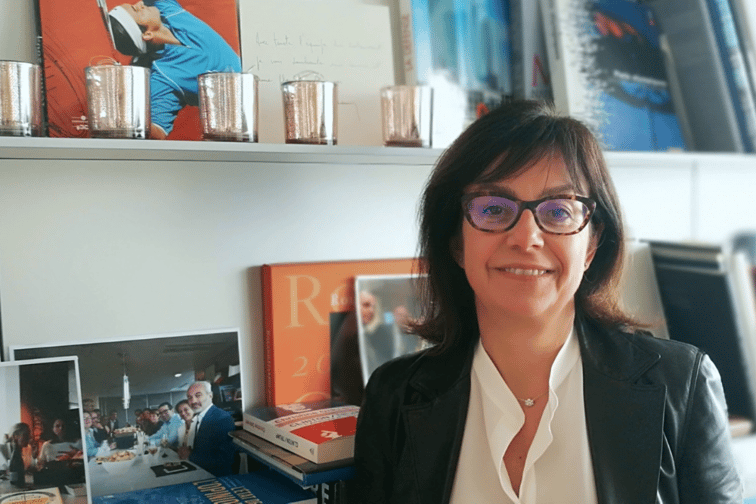

“It is not always easy to speak up when you are one of very few women, or even the only woman in the meeting room. I have learnt that you need to be confident and express your views even though they may be different. Like many women, I have sometimes felt that I had to do more than my male colleagues in order to gain legitimacy and recognition.”
Sharing her personal experiences of working across the financial services sector, Isabelle Santenac (pictured), global insurance leader at EY, offered some of the key insights she has gleaned through her own diversity, equity and inclusion (DE&I) journey to date.
As the EY global insurance leader, Santenac works with a team of over 23,000 industry professionals committed to shaping and transforming a highly disrupted industry. She previously served as the managing partner for EY’s EMEIA Financial Services Assurance business for seven years, after having been its Global Assurance COO in London for five years.
While not new to working within the insurance ecosystem, Santenac noted that she served as the lead partner for large international financial institutions headquartered in Europe since 2000, where her clients were primarily in the banking industry. It was seven years ago that she first became involved in the insurance sector, she said, a move which represented quite the sea change.
“I found the insurance industry to be very interesting considering its key objective is to protect our society,” she said. “In recent years, I have increased my commitment to sustainable initiatives which led me to becoming a board member of Positive Planet, a non-profit organisation for which EY provides skilled sponsorships via its social responsibility programme, EY Ripples.”
Looking at how the insurance industry has changed in recent years, she highlighted how, as the sector has started to become more diverse, it has gained a greater understanding of the role that having a diverse talent pool plays in thinking differently. This, in turn, has led to a greater understanding of why it is important for women to have a seat at the table.
“When pitching to potential clients, I increasingly see that a team’s diversity is a key factor in being successful in the pitch process,” she said. “This is something that has always been important to me as I strongly believe that it makes a team more successful.
“Our clients are expecting to have teams working for them who reflect their own organisation. Having a team with different backgrounds is the only way to ensure you will have solutions which fully meet a wide range of needs.”
DE&I initiatives, including mentorship and sponsorship opportunities, have been “hugely valuable” in helping her achieve what she has, Santenac said, and she can attest to how much has changed in the financial services space in the past 30 years. When she first started, finding female mentors or sponsors was challenging, and there was an underlying expectation that women should behave like men.
“Thankfully, things have changed and there are now more mentorship opportunities for women to be inspired by successful women,” she said. “I see my role as someone who champions initiatives and looks for opportunities to include women at all stages of their careers to help them progress. Using your voice to raise up other women is critical to increasing our role in this industry and working towards an equitable future.”
Mentorship is a particularly powerful tool, Santenac said, and one which works to the benefit of both the mentor and the mentee. Sometimes it is viewed as a one-way street, with only knowledge being shared by the more senior or experienced person; but knowledge goes both ways.
“We can learn so much from each other when building a relationship based on trust,” she said. “Mentorship exposes both parties to new ways of working and encourages empathetic leadership, develops core skills, and much more. My objective when I am mentoring women, within EY or outside EY, is to help them articulate what they are looking for in their careers, what are their aspirations. Then you can have a productive discussion and find the best ways to achieve their goals.”
The power of a diverse team is not lost on EY’s clients, she said, but it also has implications for the internal mechanism of any insurance-related business. Diversity of thought is a huge asset and illustrates a firm’s commitment to encouraging and supporting change, and diverse teams are more inclusive and so much more attractive to talent prospects.
Santenac noted that she regularly hears from new talent joining EY that their decision ultimately came down to the diversity of the people who interviewed them. This gives them great confidence in the culture of the company. However, she said, having a diverse team at the highest level of an organisation requires constant focus and effort to ensure appointment decisions are not biased.
For her part, Santenac has a key message to deliver to women starting out in the sector today: “Believe that you are ready to apply or step up for that new job or opportunity. I hear from so many women that they do not think they are ready – do not be afraid to express your interest. This is where mentorship in an organisation is important to convince women that they are ready for those opportunities.”
What are your thoughts on Isabelle Santenac’s story? Feel free to share them in the comment box below.
